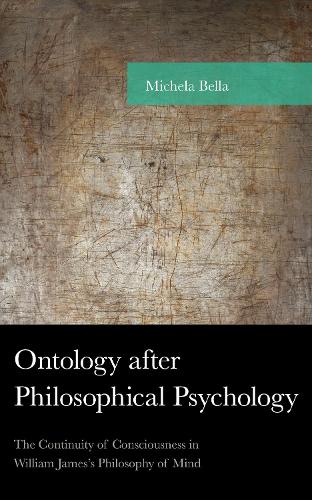
Ontology after Philosophical Psychology: The Continuity of Consciousness in William James's Philosophy of Mind
(Hardback)
Publishing Details
Ontology after Philosophical Psychology: The Continuity of Consciousness in William James's Philosophy of Mind
By (Author) Michela Bella
Bloomsbury Publishing PLC
Lexington Books
21st August 2019
United States
Classifications
Professional and Scholarly
Non Fiction
191
Physical Properties
Hardback
270
Width 161mm, Height 229mm, Spine 26mm
581g
Description
Ontology after Philosophical Psychology addresses the question of William Jamess continuity of consciousness, with a view to its possible actualizations. In particular, Michela Bella critically delineates James's discourse. In the wake of Darwin's theory of evolution at the end of the nineteenth century, James's reflections emerged in the field of physiological psychology, where he developed for the case for a renewed epistemology and a new metaphysical framework to help us understand the most interesting theories and scientific discoveries about the human mind. Bellas analysis of the theme of continuity makes it possible to appreciate, both historically and theoretically, the importance of James's gradual transition from making observations of experimental psychology on the continuity of thought to developing an epistemological and ontological argument that continuity is a characteristic of experience and reality. This analysis makes it possible both to clarify James's position in relation to his historical context and to highlight the most original results of his work.
Reviews
Henri Bergson said we were sure to misunderstand William James's thought if we did not read him integrally. Michela Bella's book perfectly rises to this challenge by showing that the idea of continuity illuminates his psychology as well as his philosophy. She argues convincingly that continuity is the connecting tread linking his pragmatism, his radical empiricism, his pluralism and his meliorism. She also offers us an extremely enlightening study on the sources of this psychology and ontology of continuity, as well on the side of the United States (Peirce) as of Europe (Mach and Bergson). It is a book to read for anyone seeking to escape rigid dualisms and clear-cut dichotomies. -- Stphane Madelrieux, Universit Jean Moulin - Lyon 3
Michela Bella offers a sophisticated and updated fresco of the thought of William James, illuminating in a clear language the complex continuity of his ontology with the philosophical and psychological methodology. This book is an important and precise contribution to current discussion of the most delicate issues of philosophy of mind, but also a documented invitation to amend the many misunderstandings and fragmentations that have surrounded the work of this great figure of philosopher and psychologist. -- Rosa Maria Calcaterra, Universit degli Studi Roma Tre
Ontology after Philosophical Psychology: The Continuity of Consciousness in William Jamess Philosophy of Mind provides the first systematic analysis to date of the issue of continuity in William Jamess psychology, metaphysics, and epistemology. Through her incisive exegesis of many of Jamess writings and by comparing Jamess views with those held by Charles S. Peirce, Henri Bergson, and Ernst Mach, Bella demonstrates persuasively that Jamess initial psychological analysis of the felt continuity of the stream of thought was the very source of the philosophical positions for which he is known: radical empiricism, pragmatism, and pluralism. With this important work, Michela Bella has made herself into a major player in the vigorous transatlantic field of James studies. -- Francesca Bordogna, Notre Dame
Author Bio
Michela Bella is postdoctoral researcher at Universit de Nantes.
